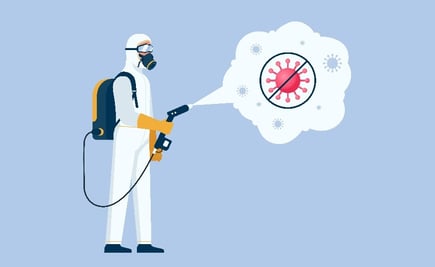Some question whether COVID-19 precautions are gumming up our immune systems
Chances are you masked up, kept a safe distance from others and washed or disinfected your hands more frequently than ever during the pandemic. And by all measures, those hygienic measures helped. But some people question whether by taking these actions, we have weakened our immune systems and made ourselves more vulnerable to harmful viruses, bacteria and other microbes in the future.

It's not a new idea. In 1989 David Strachan, MRCP, of the Department of Epidemiology and Population Sciences, London School of Hygiene and Tropical Medicine, proposed that an excessive emphasis on antisepsis can lead to misalignments of the immune system. It was coined the “hygiene hypothesis.” 1
So, is there such a thing as being too clean? Have we put too much stock in hygienic practices? And can we afford to back off now, just as we seem to be emerging from a pandemic? As with so many COVID-related issues, the answer is yes ... and no.
The microbiome
Humans are ecosystems, and the microbes that live on and in us (the human microbiome) constitute an organ at least as essential to health as our liver or kidneys.2 And each of us is host to trillions of microbes – bacteria, viruses, protozoa, fungi.3
Why bring this up in the context of hygiene?
The microbiome plays critical roles in the training and development of major components of our immune system, while the immune system helps maintain key features of host/microbe symbiosis. Imbalances in the interaction of microbiota and the immune system are believed to contribute to a multitude of immune-mediated disorders. 4
Even prior to COVID-19, humans were at a crossroads of a biosocial process -- the continued loss of gut microbial diversity and ancestral microbes among a large swath of the world’s population. This loss of diversity has accelerated over the past several decades, likely affecting the coexistence between humans and our microbial residents and contributing to noncommunicable diseases, including obesity, asthma, cardiovascular disease and brain disease. 5
How did this happen?
The microbiota plays a fundamental role in the training and functioning of our immune system. In turn, the immune system maintains the symbiotic relationship of the host with these highly diverse and evolving microbes. When operating optimally, this immune system/microbiota alliance offers protective responses to pathogens as well as tolerance to innocuous antigens. However, in high-income countries, overuse of antibiotics, changes in diet, and elimination of intestinal parasites (e.g., roundworms) have brought about a microbiota that lack the resilience and diversity required to establish balanced immune responses. This phenomenon may account for some of the rise in autoimmune and inflammatory disorders in some parts of the world.6
Put another way, human populations have never experienced microorganisms like those harbored by individuals living in the industrialized world today. This “new,” industrial microbiota has been shaped by recent progress in medicine, food, and sanitation. Technology and medicine have limited our exposure to pathogenic microbes, but many of these advances have been implemented without our understanding of the collateral damage inflicted on our resident microbes. 7 Now add on top of that COVID-19.
COVID precautions
How do the hygiene-related precautions of the current pandemic fit into this picture?
Social interactions are key contributors to the formation and maintenance of gut microbiota. COVID-19 control efforts -- including isolation, physical distancing, the implementation of social bubbles, mobility restrictions and border closures – have disrupted or transformed social interactions and mobility patterns associated with microbial transfer. 8
The impact might be felt years from now, as today’s children grow up. That’s because the immune system is a learning device, and at birth it resembles a computer with hardware and software but few data. Additional data must be supplied during the first years of life, through contact with microorganisms from other humans and the natural environment. If these inputs are inadequate or inappropriate, the regulatory mechanisms of the immune system can fail. 9 COVID-19-related restrictions may interfere with the process.
A matter of balance
“This isn’t a paean to infections and poor hygiene, but a reminder of the importance of balance,” writes Eran Bendavid, M.D., associate professor of medicine, Stanford Woods Institute for the Environment, in a recent commentary “COVID and the ‘Hygiene Hypothesis’” in The Wall Street Journal.10
“The extreme concern for hygiene at the onset of Covid-19 was intuitive and understandable,” he writes. “The virus was spreading fast, information on routes of transmission was limited, and we as a society tried to protect one another from infection. But policies that were easy to support two years ago need re-evaluation. Distancing, deep-cleaning and masking aren’t ‘more is better’ kinds of goods.10
“On the other side of the balance, health risks from extended intensive hygiene are credible. As Omicron recedes and we internalize the paucity of Covid-19 benefits from some hygiene practices, we should balance those against the benefits we lose by shielding our immune systems from normal exposures—and the ones we withhold from children by preventing the exchange of microbes through play and smiles.”10
A learning opportunity
Some infectious disease and allergy specialists believe the concerns about COVID-19 safety precautions are overstated.11 Nevertheless, there is widespread agreement that the pandemic has presented a learning opportunity, such as studying how social inequalities, the human microbiome, and risk factors such as age or chronic disease affect susceptibility to the most serious outcomes of SARS-CoV-2 infection. It also allows examination of how COVID-19 control measures interact with various human practices and socioeconomic and ecological conditions that determine and modify microbial composition. 12
More investigation of home cleaning practices is needed, as such measures may affect microbiome transmission. Prior to the COVID-19 pandemic, some high-resource countries had already begun to recognize these insights and loosen hygienic practices.12
The pandemic also offers an opportunity to examine the consequences of reduced social contacts, isolation and physical distancing on human microbiomes. Does isolation -- individual, with families, or in social bubbles -- reduce diversity of the microbiome? How might stress and anxiety borne of social isolation influence it?12
Viewing microbiota biodiversity with an emphasis on sustainability and conservation may be an important approach to safeguarding human health. Understanding the services provided by the microbiota to humans could aid in assessing the cost vs. benefit of different aspects of lifestyle.
A key hurdle will be to establish the impact of industrialization-induced changes to the microbiota on human health. What factors are most important? Health status? Diet? Human genotype? Lifestyle? Isolating and archiving bacterial strains that are sensitive to industrialization may be required to enable detailed study of these organisms and to preserve ecosystem services that are unique to those strains and potentially beneficial to human health.13
Questions need to be asked. And answers must be found if we are to maintain a sustainable relationship with our internal microbial world.13
Footnotes
- COVID and the ‘Hygiene Hypothesis’-Wall Street Journal
- Time to abandon the hygiene hypothesis: New perspectives on allergic disease, the human microbiome, infectious disease prevention and the role of targeted hygiene – Perspectives in Public Health
- Probiotics – Cleveland Clinic
- Interaction between microbiota and immunity in health and disease – Cell Research
- The hygiene hypothesis, the COVID pandemic, and consequences for the human microbiome – Proceedings of the National Academy of Sciences of the United States of America
- Role of the Microbiota in Immunity and inflammation – Cell
- Vulnerability of the industrialized microbiota – Science
- The hygiene hypothesis, the COVID pandemic, and consequences for the human microbiome – Proceedings of the National Academy of Sciences of the United States of America
- Time to abandon the hygiene hypothesis: New perspectives on allergic disease, the human microbiome, infectious disease prevention and the role of targeted hygiene – Perspectives in Public Health
- COVID and the ‘Hygiene Hypothesis’-Wall Street Journal
- Pandemic precautions made for an illness-free year for many. What that means for our immune systems – The Philadelphia Inquirer
- The hygiene hypothesis, the COVID pandemic, and consequences for the human microbiome – Proceedings of the National Academy of Sciences of the United States of America
- Vulnerability of the industrialized microbiota – Science



Share Article